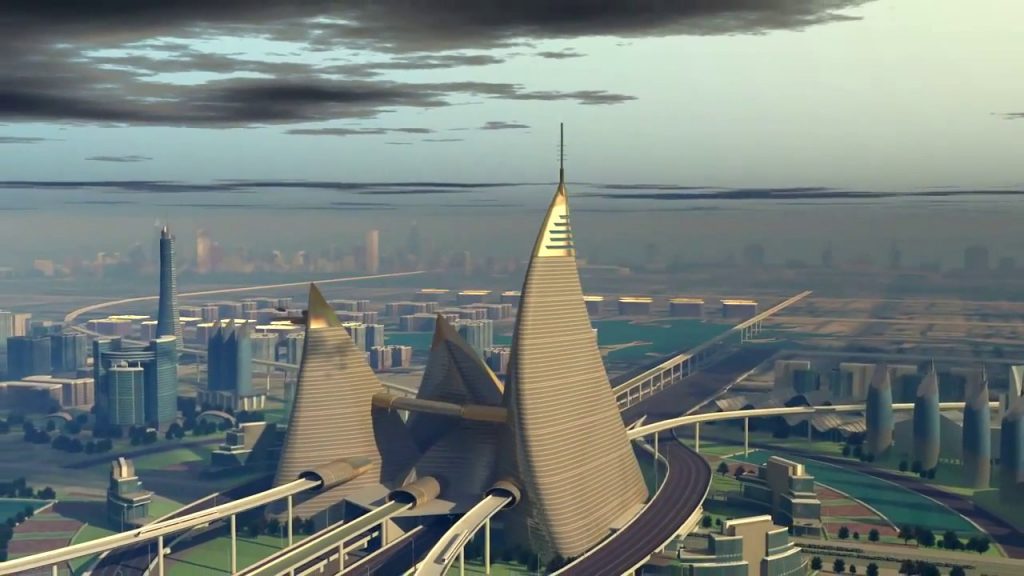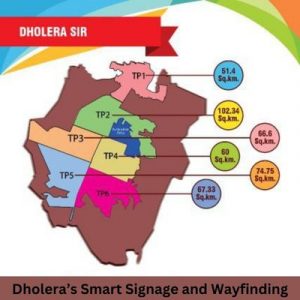In the evolving narrative of urban development, smart cities stand at the forefront. Among the numerous projects globally, the Dholera Special Investment Region (DSIR) in India is carving a niche for itself. This ambitious project, located in the state of Gujarat, is not just a blueprint for a new city but a harbinger of how urban spaces can be reimagined to foster sustainability, connectivity, and efficiency. This blog delves into Dholera’s contribution to smart city research and its implications for the future of urban planning.
The Genesis of Dholera Smart City
The inception of Dholera Smart City is rooted in the Indian government’s vision to create world-class infrastructure that can drive economic growth and improve the quality of life. Launched as part of the Delhi-Mumbai Industrial Corridor (DMIC) initiative, Dholera is envisaged as a model city that embodies advanced technologies and sustainable practices. The project spans over 920 square kilometers and is expected to accommodate over 2 million residents.
Strategic Location and Planning
Dholera’s strategic location, approximately 100 kilometers from Ahmedabad and close to the Gulf of Khambhat, positions it as a key node in India’s economic landscape. The city’s master plan incorporates state-of-the-art infrastructure, efficient public transportation, and robust connectivity, making it a prime candidate for smart city research and development.
Pillars of Dholera’s Smart City Model
Dholera’s smart city framework is built upon several pillars, each contributing to the overarching goal of creating a sustainable, efficient, and livable urban environment.
1. Smart Infrastructure
At the heart of Dholera’s development is its smart infrastructure. This includes:
- Integrated Command and Control Centre (ICCC): The ICCC acts as the brain of the city, monitoring and managing various urban services in real-time. It integrates data from multiple sources, including traffic systems, utilities, and security services, to ensure seamless operations and quick response to emergencies.
- Smart Grid: Dholera’s energy management system is designed to optimize energy consumption, reduce wastage, and integrate renewable energy sources. The smart grid infrastructure allows for real-time monitoring and efficient distribution of electricity.
- Efficient Water Management: The city employs advanced water management techniques, including rainwater harvesting, recycling, and smart metering. These initiatives ensure the sustainable use of water resources and minimize wastage.
2. Sustainable Urban Development
Sustainability is a core tenet of Dholera’s smart city vision. The city’s design prioritizes green spaces, energy-efficient buildings, and sustainable transportation options. Key features include:
- Green Buildings: Dholera promotes the construction of buildings that meet high environmental standards. These structures incorporate energy-efficient materials, solar panels, and smart lighting systems to reduce carbon footprints.
- Public Transportation: The city’s transportation network is designed to reduce reliance on private vehicles. With a focus on electric buses, bike-sharing programs, and pedestrian-friendly pathways, Dholera aims to minimize traffic congestion and pollution.
- Waste Management: Dholera employs innovative waste management solutions, including automated waste collection, segregation, and recycling. The goal is to achieve a zero-waste city through efficient and sustainable practices.
3. Digital Connectivity
Digital connectivity is a cornerstone of any smart city, and Dholera is no exception. The city is equipped with high-speed internet, IoT devices, and smart applications that enhance the quality of life for its residents. Notable aspects include:
- Wi-Fi and Broadband: Comprehensive Wi-Fi coverage and high-speed broadband ensure that residents and businesses are always connected. This digital backbone supports various smart applications and services.
- IoT Integration: IoT devices are embedded throughout the city to monitor environmental conditions, manage traffic, and enhance security. These devices collect and transmit data to the ICCC, enabling data-driven decision-making.
- Smart Applications: Dholera offers a range of smart applications that facilitate e-governance, healthcare, education, and other services. These applications provide residents with convenient access to essential services and information.
4. Economic Opportunities
Dholera is not just a residential hub but a thriving economic center. The city is designed to attract investments, foster innovation, and create job opportunities. Key economic drivers include:
- Industrial Zones: The city includes dedicated industrial zones that offer world-class infrastructure and connectivity. These zones are designed to attract manufacturing, technology, and logistics companies.
- Innovation Hubs: Dholera aims to become a center for innovation and entrepreneurship. The city provides support for startups, research and development centers, and technology incubators.
- Business-Friendly Policies: The government has implemented several policies to attract businesses to Dholera. These include tax incentives, streamlined regulatory processes, and infrastructure support.
5. Social Infrastructure
A smart city is not just about technology and infrastructure but also about the well-being of its residents. Dholera prioritizes social infrastructure, including:
- Healthcare: The city is equipped with advanced healthcare facilities, including hospitals, clinics, and telemedicine services. These facilities ensure that residents have access to quality healthcare.
- Education: Dholera places a strong emphasis on education, with a range of schools, colleges, and vocational training centers. The city also promotes digital learning through e-education platforms.
- Community Services: Dholera offers various community services, including parks, recreational centers, and cultural facilities. These services enhance the quality of life and foster a sense of community among residents.
Dholera’s Impact on Smart City Research
Dholera’s comprehensive approach to smart city development has significant implications for research and innovation in urban planning. The city serves as a living laboratory for testing new technologies, policies, and practices.
Research in Urban Mobility
Dholera’s transportation system, which integrates smart traffic management, electric vehicles, and public transportation, provides valuable data for research on urban mobility. Researchers can study the impact of these innovations on traffic congestion, pollution, and commuter satisfaction.
Energy Efficiency and Sustainability
Dholera’s smart grid and sustainable building practices offer a rich source of data for researchers focused on energy efficiency and sustainability. The city’s efforts to integrate renewable energy and optimize energy consumption provide insights into the feasibility and impact of such initiatives.
Data-Driven Governance
The ICCC and IoT infrastructure in Dholera enable real-time data collection and analysis. This data is invaluable for researchers studying the impact of data-driven governance on urban management and service delivery.
Social and Economic Development
Dholera’s emphasis on economic opportunities and social infrastructure provides a unique context for research on urban economic development and quality of life. Researchers can examine the effectiveness of policies and initiatives designed to attract businesses, foster innovation, and improve residents’ well-being.
Challenges and Lessons Learned
While Dholera’s progress is impressive, the project also faces challenges that offer valuable lessons for future smart city developments.
Financing and Investment
Securing adequate financing for large-scale infrastructure projects is a significant challenge. Dholera’s experience highlights the importance of public-private partnerships and innovative financing models in overcoming these hurdles.
Technology Integration
Integrating diverse technologies into a cohesive smart city framework is complex. Dholera’s journey underscores the need for robust planning, standardization, and interoperability to ensure seamless technology integration.
Community Engagement
Engaging residents and stakeholders in the planning and implementation process is crucial for the success of smart city projects. Dholera’s efforts to involve the community offer insights into effective strategies for fostering public participation and buy-in.
Scalability and Replicability
One of the key goals of smart city research is to develop models that can be scaled and replicated in other contexts. Dholera’s experience provides valuable lessons on the scalability of smart city solutions and the factors that influence their successful replication.
The Future of Dholera and Smart Cities
Dholera’s ongoing development and its contributions to smart city research are just the beginning. As the city continues to grow and evolve, it will provide further insights and innovations that can shape the future of urban planning globally.
Emerging Technologies
The integration of emerging technologies such as artificial intelligence, blockchain, and 5G networks will play a crucial role in the next phase of Dholera’s development. These technologies have the potential to enhance the city’s efficiency, security, and quality of life.
Global Collaboration
Dholera’s success can serve as a model for other cities around the world. By fostering global collaboration and knowledge exchange, cities can learn from each other’s experiences and accelerate the adoption of smart city solutions.
Policy and Governance
Effective policy and governance frameworks are essential for the success of smart city initiatives. Dholera’s experience highlights the need for adaptive policies that can respond to evolving technologies and urban challenges.
Inclusive Development
Ensuring that smart city development is inclusive and benefits all residents is a critical priority. Dholera’s focus on social infrastructure and community engagement provides valuable lessons on promoting inclusivity and equity in urban development.
Conclusion
Dholera’s journey as a smart city pioneer offers a wealth of insights and innovations that are shaping the future of urban planning. From its smart infrastructure and sustainable practices to its digital connectivity and economic opportunities, Dholera is setting new standards for what modern cities can achieve. As researchers, policymakers, and urban planners continue to study and learn from Dholera’s experience, the lessons gleaned will inform the development of smarter, more sustainable, and more inclusive cities worldwide. The vision of Dholera is not just about building a city; it’s about creating a blueprint for the future of urban living.




